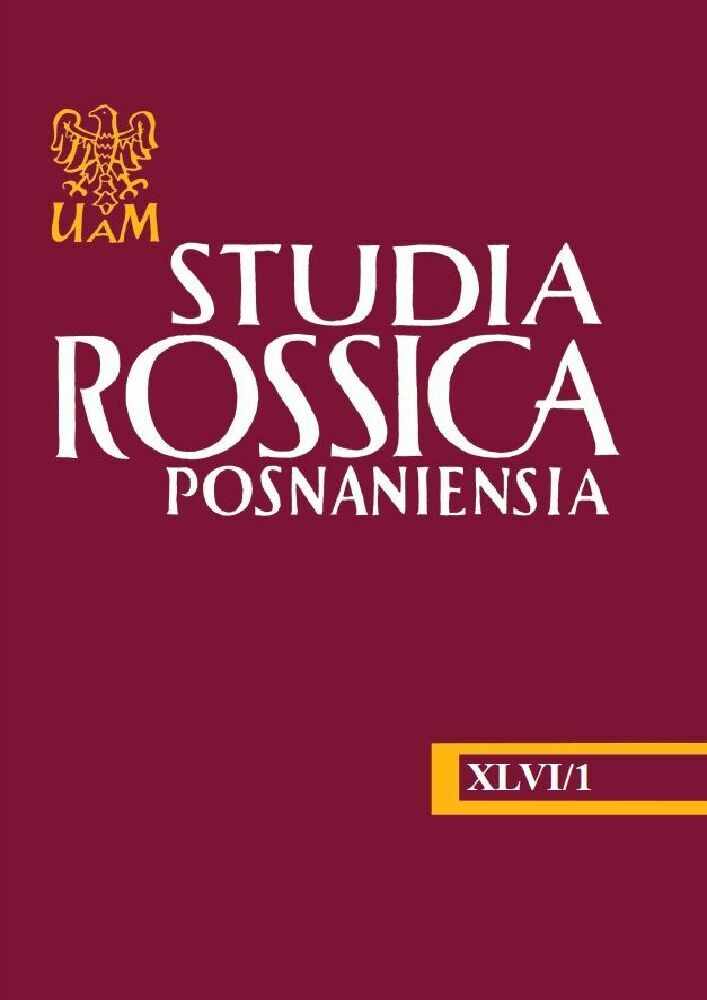Abstrakt
The article presents the study of the short film Apocrypha by Andrei Zvyagintsev. The text is aimed at the interpretation of the movie in the context of the problem of memory, which is emphasised in the selected work in the explicit and implicit visual associations with the figure and poetry of Iosif Brodsky. The recognition of these characteristic elements in the structure of Zvyagintsev’s film has the influence on the perception of its meaning, leading the culturally aware recipient towards discovering its broad interpretative potential in view of the Russian literary tradition. The study is conducted using the comparative method of analysis. The core theory which constitutes the methodological foundation of the study is Astrid Erll’s concept of cultural memory expounded as intertextuality, i.e. the continuous building up of layers of texts, which are mediated, as well as her idea of transcultural memory, defined in the first instance as a process of fluctuation between the individual and collective level of remembering. Attention is turned to the motifs, which are characteristic both for Brodsky’s and Zvyagintsev’s poetics, such as the aquatic symbolism, temporal and topographical relationships, chromatography of cold colours etc. The application of the selected methodology in the presented discussion allows for exposing the dynamics of the changing nature of culture, which becomes the container of the social and territorial fluctuations of memory.
Bibliografia
Auden, Wystan H. Funeral Blues. 1938. Web. 22.06.2020. https://allpoetry.com/Funeral-Blues.
Bal, Mieke. “Migracja: estetyki migracyjne na rzecz nowych sposobów widzenia”. Migracyjna pamięć, wspólnota, tożsamość. Eds. Roma Sendyka, Tomasz Sapota, Ryszard Nycz. Trans. Anna Kowalcze-Pawlik. Warszawa, Instytut Badań Literackich PAN Wydawnictwo, 2016, p. 53–91.
Brodskij, Iosif. Peterburgskij roman. 1961. Web. 22.06.2020. http://www.world-art.ru/lyric/lyric.php?id=7364.
Brodskij, Iosif. Poldenʹ v komnate. 1978. Web. 22.06.2020. https://45parallel.net/iosif_brodskiy/polden_v_komnate.html.
Brodsky, Joseph. “In a Room and a Half”. Less than One: Selected Essays. Penguin Books, London, 2011. Web. 22.06.2020. https://www.rulit.me/books/less-than-one-selected-essaysread-460625-92.html.
Câpka, Vladimir. Obzor korotkometražek Andreâ Zvâginceva. 2017. Web. 22.06.2020. http://1kfilms.net/obzor-korotkometrazhek-andreya-zvyagintseva.
Erll, Astrid. “Wędrująca pamięć”. Migracyjna pamięć, wspólnota, tożsamość. Eds. Roma Sendyka, Tomasz Sapota, Ryszard Nycz. Trans. Tomasz Kunz. Warszawa, Instytut Badań Literackich PAN Wydawnictwo, 2016, p. 29–52.
Fast, Piotr. “Chłód, zimno, mróz w liryce Josifa Brodskiego”. Nowoczesność i tradycja. 50 lat wrocławskiego Instytutu Filologii Słowiańskiej. Eds. Ewa Komisaruk, Izabella Malej. Wrocław, Wydawnictwo Uniwersytetu Wrocławskiego, 2019, p. 103–124.
Halbwachs, Maurice. Les cadres sociaux de la mémoire. Ed. Gérard Namer. Paris, Albin Michel, 1994.
Hendrykowski, Marek. “Tematy wędrowne jako pamięć kina”. Kwartalnik Filmowy, 97–98, 2017, p. 142–153.
Klûeva, Lûdmila. “Nablûdaâ nablûdaûŝego ili Poèziâ dekonstrukcii”. Dyhanie kamnâ. Mir filʹmov Andreâ Zvâginceva. Moskva, Novoe literaturnoe obozrenie, 2014, p. 299–318.
Landsberg, Alison. “Prosthetic memory: the ethics and politics of memory in an age of mass culture”. Memory and popular film. Ed. Paul Grainge. Manchester, Manchester University Press, 2003, p. 144–161.
My ne zamečaem, kak často čitaem duši. Web. 22.06.2020. https://www.kinopoisk.ru/film/575242/reviews/.
Oden, Uisten Hʹû. Časy ostanovi, zabudʹ pro telefon… Trans. Iosif Brodsky. 1938. Web. 22.06.2020. https://www.askbooka.ru/stihi/uisten-hyu-oden/chasy-ostanovi-zabud-pro-telefon.html.
Pawletko, Beata. Josif Brodski i Tomas Venclova wobec emigracji. Katowice, Wydawnictwo Naukowe “Śląsk”, 2005.
Popov, Aleksandr. Rasskazyvaâ o samom sebe. 2016. Web. 22.06.2020. https://www.kinopoisk.ru/film/575242/reviews/.
Rosenfeld, Gavriel D. “A looming crash or a soft landing? Forecasting the future of the memory ‘industry’”. Journal of Modern History, 81, 1, p. 122–158.
Tarkowska, Joanna. Konceptualizacja Rosji i świata w poezji Josifa Brodskiego. Dom – miasto – ojczyzna. Lublin, Wydawnictwo Uniwersytetu Marii Curie-Skłodowskiej, 2007.
Welsch, Wolfgang. “Transculturality – the puzzling form of cultures today”. Spaces of culture: city, nation, world. Eds. Mike Featherstone, Scott Lash. London, Sage, 1999.
Zvjagincev, Andrej. Â pisal scenarij pro gorod, kotorogo ne videl [Interview]. 2009a. Web. 22.06.2020. http://az-film.com/ru/Publications/126-JA-pisal-scenarij-pro-gorod-kotorogo-ne-videl.html.
Zvjagincev, Andrej. Profsoûzy ubili tvorčestvo [Interview]. 2009b. Web. 22.06.2020. http://az-film.com/ru/Publications/125-Profsojuzi-ubili-tvorchestvo.html.
Zvjagincev, Andrej. “V našej novelle – vnutrennee dviženie...” [Interview]. 2009c. Web. 22.06.2020. http://az-film.com/ru/Publications/130-V-nashej-novelle--vnutrennee-dvizhenie.html.
Licencja
PRACE PUBLIKOWANE W CZASOPIŚMIE DOSTĘPNE SĄ NA LICENCJI CREATIVE COMMONS:
Uznanie autorstwa-Użycie niekomercyjne-Na tych samych warunkach 4.0 Międzynarodowe.
Autorzy tekstów przyjętych do publikacji w czasopiśmie „Studia Rossica Posnaniensia” są zobowiązani do wypełnienia, podpisania i odesłania na adres redakcji umowy o udzielenie nieodpłatnej licencji do utworów, z zobowiązaniem do udzielania sublicencji Creative Commons.
Zgodnie z umową, autorzy tekstów opublikowanych w czasopiśmie “Studia Rossica Posnaniensia” udzielają Uniwersytetowi im. Adama Mickiewicza w Poznaniu niewyłącznej i nieodpłatnej licencji oraz zezwalają na użycie sublicencji Attribution-NonCommercial-ShareAlike 4.0 International (CC BY-NC-SA 4.0).
Autorzy zachowują prawa do dalszego, swobodnego rozporządzania utworem.
Autorzy, którzy wykorzystują w swoim tekście cudze utwory (np. ilustracje, fotografie) proszeni są o dostarczenie do redakcji czasopisma zgody na publikację.
Użytkownicy internetu uprawnieni są do korzystania z utworów opublikowanych po 2015 roku “Studia Rossica Posnaniensia” tylko w celach niekomercyjnych, pod następującymi warunkami:
https://creativecommons.org/licenses/by-nc-sa/4.0/
Uniwersytet im. Adama Mickiewicza w Poznaniu zachowuje prawo do czasopisma jako całości (układ, forma graficzna, tytuł, projekt okładki, logo itp.).

